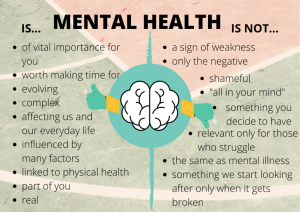Mental health education is a critical component of overall well-being, yet it is often overlooked in schools and communities. As awareness of mental health issues grows, the need for comprehensive mental health education becomes increasingly urgent. This article explores the importance of mental health education, its benefits, and the ways in which it can be effectively implemented in various settings.
1. Understanding Mental Health
Mental health encompasses emotional, psychological, and social well-being. It affects how individuals think, feel, and act, influencing their ability to cope with stress, relate to others, and make choices. Mental health education aims to provide individuals with the knowledge and skills necessary to understand and manage their mental health effectively.
Key Components
- Awareness of Mental Health Conditions: Education about common mental health issues, such as anxiety, depression, and stress, helps reduce stigma and promotes understanding.
- Recognizing Signs and Symptoms: Teaching individuals to identify signs of mental health struggles in themselves and others is crucial for early intervention.
2. Promoting Emotional Well-Being
Mental health education plays a vital role in promoting emotional well-being. By equipping individuals with coping strategies and resilience-building techniques, they are better prepared to handle life’s challenges.
Skill Development
- Coping Mechanisms: Education can teach effective coping strategies, such as mindfulness, stress management, and problem-solving skills.
- Emotional Regulation: Understanding how to recognize and manage emotions fosters greater emotional intelligence, helping individuals respond to situations more effectively.
3. Reducing Stigma and Discrimination
One of the most significant barriers to seeking help for mental health issues is stigma. Mental health education helps to combat this stigma by fostering open discussions and promoting empathy.
Creating a Supportive Environment
- Normalizing Conversations: By discussing mental health openly, individuals feel more comfortable sharing their experiences and seeking help when needed.
- Encouraging Supportive Behaviors: Education can encourage peers to support one another, creating a culture of understanding and compassion.
4. Enhancing Academic and Workplace Outcomes
Mental health significantly impacts academic performance and workplace productivity. Educating students and employees about mental health can lead to better outcomes in both settings.
Academic Success
- Improved Focus and Engagement: Students who understand and manage their mental health are more likely to be engaged and perform better academically.
- Reduced Absenteeism: Addressing mental health proactively can lead to lower rates of absenteeism and dropout.
Workplace Productivity
- Enhanced Performance: Employees who prioritize their mental health tend to be more productive, creative, and committed to their work.
- Lower Turnover Rates: Organizations that promote mental health education may experience reduced turnover and improved employee satisfaction.
5. Implementing Mental Health Education
To effectively integrate mental health education into schools and workplaces, several strategies can be employed:
1. Curriculum Development
- Incorporating Mental Health Topics: Schools can create comprehensive curricula that include mental health topics as part of health education, social studies, or personal development courses.
2. Training for Educators and Staff
- Professional Development: Providing training for teachers and workplace leaders on mental health awareness and support strategies can enhance their ability to address these issues effectively.
3. Community Engagement
- Workshops and Seminars: Hosting community workshops can raise awareness and provide valuable resources for individuals seeking help or wanting to learn more about mental health.
4. Peer Support Programs
- Creating Support Networks: Establishing peer support groups can empower individuals to share their experiences and seek help in a safe, supportive environment.
 Conclusion
Conclusion
The importance of mental health education cannot be overstated. By fostering understanding, reducing stigma, and promoting emotional well-being, mental health education equips individuals with the tools they need to navigate life’s challenges effectively. As we continue to prioritize mental health in our schools, workplaces, and communities, we can create a culture that values well-being and supports individuals in their journey toward mental wellness. Investing in mental health education is not only beneficial for individuals but also for society as a whole, fostering healthier, more resilient communities.


